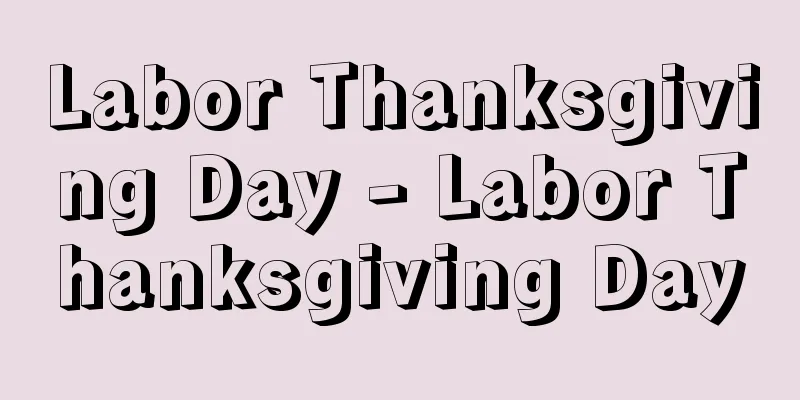Labor Thanksgiving Day - Labor Thanksgiving Day

|
November 23rd. A national holiday for "celebrating hard work, production, and mutual gratitude among the people." It was established in 1948 (Showa 23). Prior to that, it was a national holiday and was the day of the Niiname-sai festival, when the Emperor would offer new grain to the gods of heaven and earth and then eat it himself. As a result, this day is still strongly associated with festivals for those involved in agriculture. [Moriwaki Itsuo] Source: Shogakukan Encyclopedia Nipponica About Encyclopedia Nipponica Information | Legend |
|
11月23日。「勤労をたつとび、生産を祝い、国民がたがいに感謝しあう」国民の祝日。1948年(昭和23)制定された。その前は国の祭日で、天皇が新穀を天神地祇(てんじんちぎ)に勧め、自らも食する新嘗祭(にいなめさい)という祭事の日であった影響でこの日はいまも農業関係者の祭典の色彩が濃くみられる。 [森脇逸男] 出典 小学館 日本大百科全書(ニッポニカ)日本大百科全書(ニッポニカ)について 情報 | 凡例 |
>>: Working Student Support Association
Recommend
Calathea genus
...It overwinters at 8 to 10 degrees Celsius. It ...
Anne Frank House - Anne Frank's House
…The City Hall began to be used as a royal palace...
Teredinidae
...They are widely distributed along the continen...
Kataoka Gato
…(8) The 8th (1810-1863, Bunka 7-Bunkyu 3), with ...
Magistrate of Sado
This was one of the Edo Shogunate's magistrat...
Writing education - sakubunkyoiku (English spelling)
This refers to education that teaches students the...
Alpha rice - Alpha rice
It is an instant food product that is made by imm...
Kunanbaev, A.
…He has also written research papers on folklore ...
Dog and cat hospital - Inunekobyoin
This refers to a hospital (clinic) opened by a ve...
Sebeok, TA (English spelling) SebeokTA
… [Toshiyuki Kitamori] [Application to social sci...
Obanazawa Basin
...It is also called the Murayama Basin. To the n...
Crushed peasant - crushed peasant
In the Edo period, this term refers to peasants wh...
Stern, W.
...A branch of psychology that seeks to clarify t...
"Rakusho" - Gakusho
…It was presented to Emperor Huizong in 1101 (the...
Large drum (leather) - Okawa
...A type of Japanese percussion instrument. Also...









